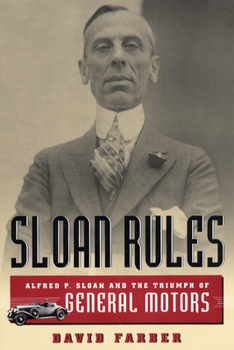Sloan Rules: Alfred P. Sloan and the Triumph of General Motors
Select Format
Select Condition 
Book Overview
Alfred P. Sloan Jr. became the president of General Motors in 1923 and stepped down as its CEO in 1946. During this time, he led GM past the Ford Motor Company and on to international business triumph... This description may be from another edition of this product.
Format:Hardcover
Language:English
ISBN:0226238040
ISBN13:9780226238043
Release Date:November 2002
Publisher:University of Chicago Press
Length:299 Pages
Weight:1.45 lbs.
Dimensions:1.2" x 6.0" x 9.0"
Related Subjects
19th Century 20th Century Biographical Biographies Biographies & History Biography & History Business Business & Finance Business & Investing Company Profiles Engineering Geography History Human Resources & Personnel Management Industries & Professions Modern (16th-21st Centuries) Popular Economics Professionals & Academics Regional Textbooks TransportationCustomer Reviews
2 ratings
Great insight into the mind of a great strategist.
Published by Thriftbooks.com User , 19 years ago
Mr. Faber has done a great job of puting together Alfred Sloan story, in a way that Mr. Sloan, himself, would accept as a balanced biography (although I think he wouldn't like to be so exposed in public!!!) Many concepts that today are taken for granted as part of the tools available to the professional manager, were actually part of the ideas used by Mr. Sloan to guide GM into leadership of the Automobile Market. Mr. Faber has done a superb job of presenting these concepts in the context of history and the people with whom Mr.Sloan built GM. The story is so good that may inspire today's managers into action. Faber does a very interesting analysis trying to understand the mind of Mr. Sloan, specially in his relations with the Roosevelt Administration during the New Deal and Second World War. Today it would be more difficult for people in general to accept some of the positions Mr. Sloan had taken in this period. One point to be remembered is that today the record of successful mergers is dismal. Mr Sloan major contribution was taking General Motors,in the early 1920s, an amalgam of deals put together by Durant, which were in a state of disarray and puting together a rational and effective organization. To do this Mr. Sloan was brilliant by using concepts like market segmentation, descentralization, corporate control, productivity/efficiency control...he was a true strategist. Due to the lack of records, it would be impossible for the author to describe the details of the implementation of this great task done by Mr Sloan. Great read, essential reading for anyone that wants to understand the ways of Big Business...
Uncovering a Man of Mystery
Published by Thriftbooks.com User , 21 years ago
The frustrating thing for biographers writing about Alfred P. Sloan is the paucity of information about what made the man tick. Sloan was meticulously careful not to leave material which would provide insight into his personal life, his thoughts, or his motivations. Instead, Sloan was careful to manage information in such a way that his persona as the supremely rational corporate leader was maintained. David Farber understands that people are more complex, and he offers tantalizing hints into Sloan's motivations. Farber focuses on two important chapters in Sloan's career--his crucial role in the stabilizing of General Motors, the creation of the quixotic Billy Durant, and the impact of the New Deal on corporate America, specifically GM. As for the first, Farber details Sloan's career development after his graduation from MIT and after his father secured a position for him with Hyatt Roller Bearing Company. Hyatt's relationship with GM led Sloan to that company at a crucial point, when the DuPont family had secured their investment by forcing out Billy Durant. Sloan seemed the opposite of Durant, making decisions in a supremely rational way and focusing on the bottom line. Symbolic of this is Sloan's decision to place each car in the GM line to appeal to particular income levels. So is his development of a master plan for GM, which ultimately led the corporation to unprecedented profitability, even during the Depression.It was the Depression and the New Deal that brought Sloan's attitude into fairly direct conflict with the likes of Franklin Roosevelt, Secretary of Labor Frances Perkins, and labor leader John L. Lewis. Farber is clearly disappointed in the almost total lack of social consciousness exhibited by Sloan. Sloan could never understand why anyone would have a problem with the ways GM treated its production workers. Farber has written a spare yet remarkably helpful book that is about both a man and a period in American history. Even though so little information exists about Sloan the man, Farber makes it evident that the tragedy of Sloan's life was that he never understood his own limitations. Like many rich people (he once shouted to Frances Perkins, "I am Alfred P. Sloan! I am worth seventy million dollars!"), Sloan believed himself entitled to have his way. He simply did not believe that he could be wrong. Not in anything. General Motors is still recovering from Sloan's hubris. Decades of shoddy products (Farber gives GM products more credit than I, a former owner of three Buicks each of which was worse than the last), foolish responses to criticism, failed attempts at reorganization, and similar episodes in the post-Sloan years have led GM to the point at which the new president, Bob Lutz, is more like Billy Durant. Historical irony prevails.





